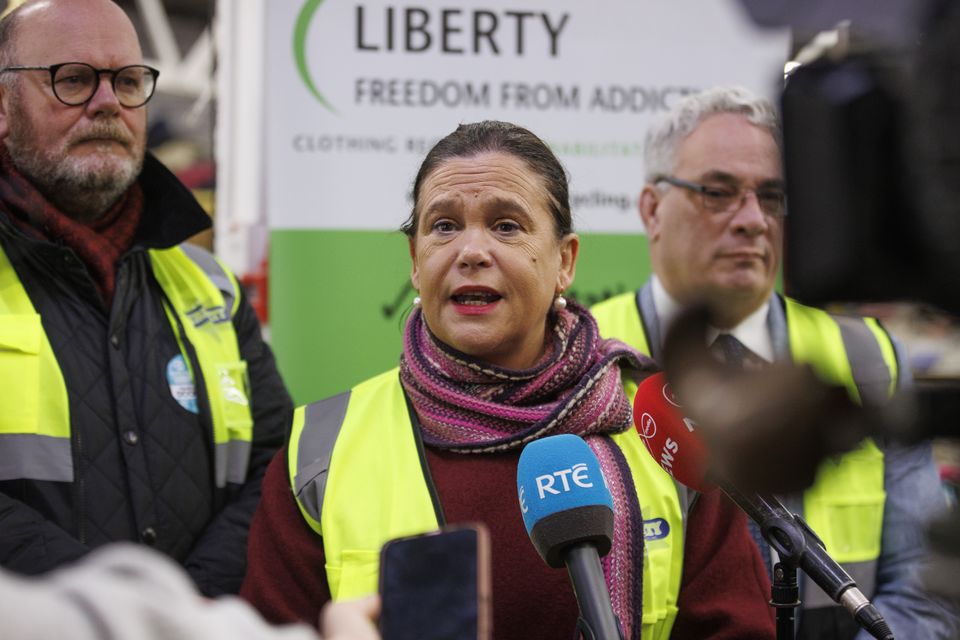Fianna Fail’s refusal to contemplate Sinn Fein as a coalition partner is policy-based and not personal, Micheal Martin has insisted.
Mr Martin again made clear he would not engage with Sinn Fein in relation to government formation post-election.
In response, Sinn Fein president Mary Lou McDonald claimed the Fianna Fail leader appeared determined to ensure Fine Gael returned to power alongside him following Friday’s General Election.
Sinn Fein leader Mary Lou McDonald said that Fianna Fail was ‘determined’ to allow Fine Gael back into power (Liam McBurney/PA)
Mr Martin and Ms McDonald were both canvassing in the Dublin South Central constituency on Tuesday morning.
The Tanaiste and Fianna Fail leader Mr Martin was asked by reporters to explain his reasoning for ruling out Sinn Fein as coalition partners.
“First of all, we have to deliver on our mandate, we’re elected by people,” he said.
“People vote for Fianna Fail and the vast majority of Fianna Fail voters are voting for Fianna Fail on the basis of our clear principles around an enterprise economy, around the positive, pro-European position, around our commitment to home ownership and the democratic nature of our party, and the vast majority favour the position I’ve adopted, and it’s on policy grounds.”
He added: “The Sinn Fein position on the economy, with 3.5 billion euros of tax increases, would destroy small to medium-sized enterprises.
“If you go through the detail of the Sinn Fein manifesto, you will see a recipe for the undermining of small to medium-sized companies and the whole enterprise and entrepreneurial spirit within Irish society. That is my view. It’s a strongly held view, and it’s legitimate in politics to have differences of policy, and that’s fair enough.”
Asked if it was a hard no in relation to negotiating with Sinn Fein, he confirmed it was.
“The same happened in 2020, the same happened in 2016 – we didn’t engage on policy grounds,” he said of the last two general elections in Ireland.
Mr Martin was then asked if he had an issue with personalities in Sinn Fein, such as Ms McDonald.
“This isn’t personal,” he added.
“I mean anybody who knows me knows that I focus always on policy and the substance of issues, not on personalities.
“We’re a democracy here, I respect people, and I respect everybody who goes forward in an election, that can be challenging for every individual.”
Later, Ms McDonald pushed back on Mr Martin’s criticism of her party’s policies. In particular, she rejected any suggestion that Sinn Fein was anti-EU, describing her party as “resolutely European”.
She added: “I see that Micheal Martin is absolutely determined to put Fine Gael back in government. I can’t fathom that. I think by any measure, if you’re actually listening to people out on the ground in the course of this campaign, people are telling him, telling everybody, that they are struggling, that they are suffering in many instances, that they are left behind. Some feel very betrayed by the Government, particularly younger people.
“But people are also saying, thankfully in increasing numbers, that they recognise that actually that can change, but it’s only going to change with a different government.”
In regard to its policies on Europe, Ms McDonald said Sinn Fein was not afraid to challenge issues within the EU, citing in particular the stance of European Commission President Ursula von der Leyen on the Gaza conflict.
“You know Micheal Martin doesn’t actually get to define what being a good European is,” she said.
“And the best kind of European, in my view, is a European that challenges its own system and its own institutions when they’re clearly doing the wrong things and works constructively for Irish interests and international interests to get things on the right track.”
